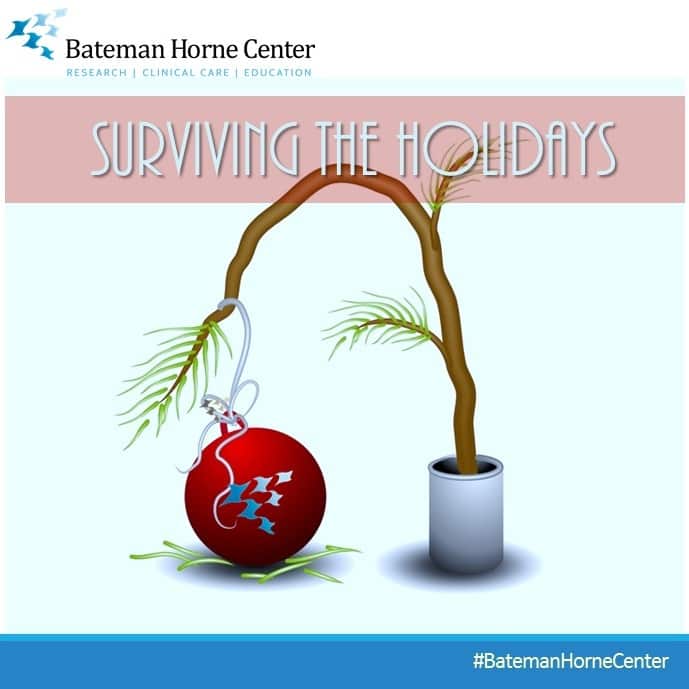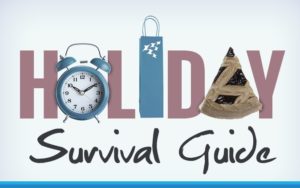Living with ME/CFS and FM changes most everything, including how we celebrate the holidays. Perhaps one of the greatest gifts you can give yourself, or a loved one, is a ‘free pass’ on the guilt you may be tempted take on when you are unable to do it all. We all want a happy and peaceful holiday season; celebrating within the boundaries of your illness can help make that a reality. Sometimes simply discussing your needs and expectations with family and friends can make a big difference.
Focus on the meaning of the holiday. From Thanksgiving through New Year’s Day the world seems to be in fast-forward. This year, try and focus on “being” vs “having”. Ask yourself:
- What is the meaning and history of the holiday we celebrate?
- How does it relate to our lives now with ME/CFS and FM?
- What is the most meaningful way we can celebrate?
Challenge traditions, create new ones. If your list of traditional activities and expectations create a sense of despair and make the holidays overwhelming, sift through your list “traditions” and make some intentional decision on the ones you keep and allow yourself to create new ones. Ask yourself “what is realistic, manageable and enjoyable then, discard or delegate everything else. Then let go of any guilt you may feel for not celebrating the holidays “right.”
Give yourself the gift of self-care. Often in our zeal to please our loved ones we neglect ourselves. You can put yourself at the top of your gift list simply by doing those things that are for your highest good. Give yourself the gift of peace of mind. Let family and friends know what you need, or need to avoid, to stay within your energy envelope.
Allow yourself to receive. Allow yourself to receive graciously, gratefully and unconditionally. The “Oh, you really shouldn’t have” syndrome is damaging to your self-esteem; it’s like saying “I’m not worth this” and it can take joy away from the giver. Accept the gift and allow yourself to embrace the feeling of love or appreciation that the gift represents.
Set boundaries. The holidays often bring a sense of social obligation, forcing us to spend time with people who make us uncomfortable. But the cost may be too high if you are being worn out emotionally and physically. Don’t feel guilty because you are taking care of yourself. Instead, invite people you care about to see you at a time that would be more convenient. Consider shooting a video on your smart phone to send your personal holiday greetings. Your boundaries may need to temporarily become a bit more rigid for you to avoid a physical and emotional post-holiday crash.
Coping with unresolved family/friend problems. Take some time to evaluate your feelings about spending time with close family and friends. Perhaps there are some people you haven’t disclosed your condition to, or worse, that you have shared with only to find that they invalidate, trivialize or dismiss your illness. Since we cannot change other people, discover whether there is something about your attitudes or perceptions that you can change to make it easier to cope with these people. If not, then you may need to consider limiting your time with them. This can be especially difficult with family, but ultimately you must make a choice: Are you willing to risk offending someone for the sake of self-preservation or the maintenance of boundaries?
Additional Holiday Survivor Resources
- Surviving Holiday Insanity with ME/CFS and FM: Balancing Expectations and Wisdom presented by Stuart Drescher, PhD. In this education meeting, originally presented on November 4, 2015, Stuart Drescher, Ph.D., presents ways to take care of yourself in the face of the increased stress of the holidays.
- Bruce Campbell of Stanford Medical Center developed self-help courses as his profession until he fell ill with ME/CFS. On his website he shares an older article, but the good advice still stands. HERE
- Toni Bernhard, J.D., is a former law professor at the University of California, Davis. She’s the author of How to Be Sick, How to Wake Up, and How to Live Well with Chronic Pain and Illness. We frequently share her articles. Here is one on surviving the holidays. HERE
- The National Pain Report is an online news site dedicated to the coverage of chronic pain. They feature the latest developments in the treatment of chronic pain, public policy impacting chronic pain as well comments from leading pain specialists and columns from chronic pain sufferers. HERE
- And lastly from Johannes Starke at the CFS Recovery Project: Surviving Christmas Craziness When You Have Chronic Fatigue Syndrome or Fibromyalgia HERE
__________
The Bateman Horne Center, a world-class center of excellence for ME/CFS and FM, is dedicated to the identification and diagnosis of patients, to bringing patients into cutting-edge research, and to the swift advance of progress.
Every donation – large or small – funds BHC program and outreach aimed at making this a reality. Please consider making us a part of your year-end giving. Donate Today!


 Lucinda Bateman, MD, is a renowned clinician, researcher, and educator. Her Johns Hopkins University Medical School training instilled an approach to care that she has employed throughout her career - the patient comes first and the unknown or unexplained does not equate to a lack of proper and compassionate care. Since starting her own practice in 2000, she has served on six boards or committees, been the principal investigator for 45 studies, authored/coauthored 40 journal articles, served as adjunct instructor and adjunct assistant professor in the University of Utah Departments of Preventative Medicine, Internal Medicine, and Anesthesiology, and lectured around the world.
Lucinda Bateman, MD, is a renowned clinician, researcher, and educator. Her Johns Hopkins University Medical School training instilled an approach to care that she has employed throughout her career - the patient comes first and the unknown or unexplained does not equate to a lack of proper and compassionate care. Since starting her own practice in 2000, she has served on six boards or committees, been the principal investigator for 45 studies, authored/coauthored 40 journal articles, served as adjunct instructor and adjunct assistant professor in the University of Utah Departments of Preventative Medicine, Internal Medicine, and Anesthesiology, and lectured around the world.